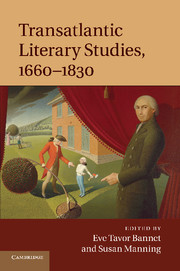Book contents
- Frontmatter
- Contents
- Notes on contributors
- Acknowledgements
- Introduction: British and American genres
- Chapter 1 Transatlantic books and literary culture
- Chapter 2 Transatlantic utopianism and the writing of America
- Chapter 3 Tales of wonder, spiritual autobiographies, and providence tales
- Chapter 4 Life writings
- Chapter 5 Benjamin Franklin and transatlantic literary journalism
- Chapter 6 Theatre, drama, performance
- Chapter 7 Transatlantic American Indians
- Chapter 8 Literature of the ocean
- Chapter 9 “To gird this watery globe”
- Chapter 10 Ghostly and vernacular presences in the black Atlantic
- Chapter 11 Susanna Rowson and the transatlantic captivity narrative
- Chapter 12 Domestic fiction and the reprint trade
- Chapter 13 Transatlantic Gothic
- Chapter 14 Transatlantic Romanticisms
- Chapter 15 Journeys of the imagination in Wheatley and Coleridge
- Chapter 16 Transatlantic historical fiction
- Further reading
- Index
- References
Chapter 7 - Transatlantic American Indians
Published online by Cambridge University Press: 05 January 2012
- Frontmatter
- Contents
- Notes on contributors
- Acknowledgements
- Introduction: British and American genres
- Chapter 1 Transatlantic books and literary culture
- Chapter 2 Transatlantic utopianism and the writing of America
- Chapter 3 Tales of wonder, spiritual autobiographies, and providence tales
- Chapter 4 Life writings
- Chapter 5 Benjamin Franklin and transatlantic literary journalism
- Chapter 6 Theatre, drama, performance
- Chapter 7 Transatlantic American Indians
- Chapter 8 Literature of the ocean
- Chapter 9 “To gird this watery globe”
- Chapter 10 Ghostly and vernacular presences in the black Atlantic
- Chapter 11 Susanna Rowson and the transatlantic captivity narrative
- Chapter 12 Domestic fiction and the reprint trade
- Chapter 13 Transatlantic Gothic
- Chapter 14 Transatlantic Romanticisms
- Chapter 15 Journeys of the imagination in Wheatley and Coleridge
- Chapter 16 Transatlantic historical fiction
- Further reading
- Index
- References
Summary
In 1809 John Norton, traveling to the southern states of the independent US for the first time, encountered a person he found hard to place: “I took him first for an Anglo American, or Foreigner, until I heard the fluent manner, in which he spoke the Cherokee; and our friend introduced us to each other; I then discovered that he belonged to the Nation; – his name was John Thompson.” Thompson, to Norton's surprise, was an Indian, and a kind of Indian few white people had ever met: “I found he was well established, with an extensive improvement, abundance of cattle, several slaves, and some Anglo American Servants. Some of his children are grown up; but his former wife, who was of his own Nation has been dead some years, and he is now married to a young American Woman.” Norton was surprised, but soon discovered that Thompson was by no means unique among the Cherokees. By the early nineteenth century many of them had become adept at living in a manner that mixed aspects of both traditional Indian and imported white culture. Indeed, the principal Cherokee leader from 1818 to 1866 was John Ross, like Thompson a man of mixed Scots and Cherokee descent, and a man valued by the Cherokees because he had expertise in both languages and cultures – vital skills as the Cherokee Nation found itself more and more needing to negotiate with land-hungry US states. Alexander McGillivray had been in a similar position as the leader of the Creek Confederacy from 1782 to 1793. The son of a Scots trader and a Creek woman of the Wind clan, and thus, since heritage was reckoned through the matrilineal line, a full Indian, McGillivray used the skills that education among whites had given him – literacy in English, experience of city society – to negotiate successfully with British generals and the American president George Washington. Transatlanticism, as McGillivray showed, flourished not just in London or New York but in the Mohawk valley, the Cherokee country, and the Creek Confederacy.
Norton had reason to know that Indians had adapted aspects of the colonists’ culture that had originated across the Atlantic (although few other Nations took to white-style agricultural methods and social patterns to the degree of the Cherokees – the “Civilized Tribe”) because he was himself an Indian of one of the Nations most adept at negotiating with the British. Teyoninhokarawen, to use his Indian name, was a Mohawk by adoption and part Cherokee, part Scottish by birth. He, Norton, was a bilingual protégé of the Mohawks' foremost war leader, Joseph Brant, a man who had visited Britain, impressed James Boswell, translated the gospel into Mohawk, and led British and Indian troops in the Revolutionary War. Retired to a land grant in Canada, Brant had ended his days living in a substantial house, attended by servants, owning slaves to work his land. And now Norton was following in his footsteps, visiting Britain to negotiate land rights, fighting alongside the British in the war of 1812, and touring the Cherokee country to recruit support for a pan-Indian resistance to US encroachment on their territories. He was a full-blown transatlantic Indian, like Thompson the product of a resourceful Indian response to the opportunities produced by the presence of colonists in America, yet determined to defend his Nation against those colonists’ ever-increasing demands. And he was a writer: his description of Thompson derives from a 1,000-page manuscript journal of his political tour that he wrote, in Latinate gentlemanly English, for publication in London. His aim, again, was to raise Indians’ reputation and publicize their case across the Atlantic: he hoped to gain further British aid for resistance to US settlement on Indian land.
- Type
- Chapter
- Information
- Transatlantic Literary Studies, 1660–1830 , pp. 106 - 123Publisher: Cambridge University PressPrint publication year: 2011



